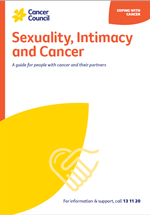- Home
- Head and neck cancers
- Managing side effects
- Sex and intimacy
Sex and intimacy
Head and neck cancer can affect your sex life in emotional and physical ways. Less interest in sex (low libido) is common. Continuing to feel tired after treatment and feeling anxious about cancer returning may also affect your sexual wellbeing. If your appearance has changed, you may grieve for how you used to look or worry about feeling attractive.
Physical challenges and side effects
Treatment may cause side effects such as dry mouth, bad breath, thick and sticky saliva, poor tongue and lip movement, facial palsy, scars, or a stiff neck and jaw. Mouth surgery may reduce feeling in the tongue or lips, but feeling should return in 12–18 months. These changes can make kissing and oral sex difficult, while any altered speech may affect your self-esteem and ability to express yourself during sex.
Managing sexual activity during treatment
During chemotherapy, use barrier contraception (e.g. condoms) during sexual intercourse to avoid exposing your partner to chemotherapy risks and to avoid getting pregnant. It is important to discuss this with your doctor to keep your partner safe and to prevent pregnancy.
Concerns about HPV and sexual transmission
You or your partner/s may worry about having sex if the cancer was HPV-related. A long-term partner is likely to have already had the virus and cleared it without having symptoms. Their immune system remembers it and stops an infection developing again. Talk to your doctor about the risk of passing on HPV to a new partner.
Some people choose to express their feelings in ways other than sex, such as cuddling, holding hands or touching cheek-to-cheek. You may wish to talk to a psychologist or sexual health professional, by yourself or with a partner, to help you find ways to adapt to any sexual changes.
For more on this, see Sexuality, intimacy and cancer.
→ READ MORE: Vision changes and hearing loss
Podcast: Sex and Cancer
Listen to more of our podcast for people affected by cancer
A/Prof Martin Batstone, Oral and Maxillofacial Surgeon and Director of the Maxillofacial Unit, Royal Brisbane and Women’s Hospital, QLD; Polly Baldwin, 13 11 20 Consultant, Cancer Council SA; Martin Boyle, Consumer; Dr Teresa Brown, Assistant Director Dietetics, Royal Brisbane and Women’s Hospital, Honorary Associate Professor, University of Queensland, QLD; Dr Hayley Dixon, Head, Clinical Support Dentistry Department, WSLHD Oral Health Services, Public Health Dentistry Specialist, NSW; Head and Neck Cancer Care Nursing Team, Royal Melbourne Hospital, VIC; Rhys Hughes, Senior Speech Pathologist, Peter MacCallum Cancer Centre, VIC; Dr Annette Lim, Medical Oncologist and Clinician Researcher – Head and Neck and Non-melanoma Skin Cancer, Peter MacCallum Cancer Centre, VIC; Dr Sweet Ping Ng, Radiation Oncologist, Austin Health, VIC; Deb Pickersgill, Senior Clinical Exercise Physiologist, Queensland Sports Medicine Centre, QLD; John Spurr, Consumer; Kate Woodhead, Physiotherapist, St Vincent’s Health, Melbourne, VIC; A/Prof Sue-Ching Yeoh, Oral Medicine Specialist, University of Sydney, Sydney Oral Medicine, Royal Prince Alfred Hospital, Chris O’Brien Lifehouse, NSW.
View the Cancer Council NSW editorial policy.
View all publications or call 13 11 20 for free printed copies.
